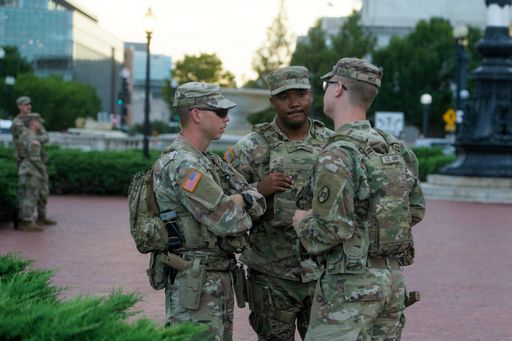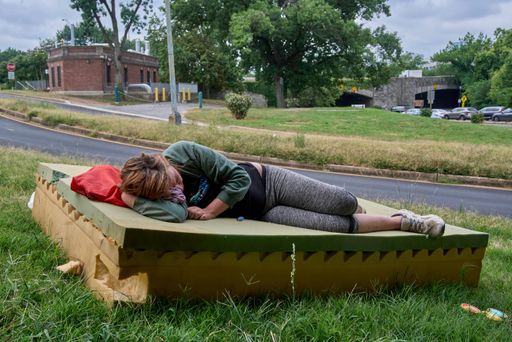US President Donald Trump appears poised to make Chicago the marquee target in his sweeping "anti-crime" campaign, following deployments of National Guard troops to Washington, DC, and Los Angeles.
The latest decision by Trump is part of a broader strategy that he claims is a crackdown on crime and immigration in Democratic-led urban centres, a hardline agenda that has already drawn fury from Democratic leaders, who accuse the White House of turning policy into theatre.
At the White House on Monday, Trump sharpened his attack, calling Chicago "a mess" and blaming what he called failed Democratic leadership for the city’s problems.
"You have an incompetent mayor. Grossly incompetent," he told reporters. "And we'll straighten that one out probably next. That'll be our next one after this. And it won't even be tough."
The remarks, made just before signing an executive order to eliminate no-cash bail for suspects in Washington, DC, underscored the president's widening confrontation with blue (Democratic) cities.

"In a certain way, you really want to be asked to go," Trump said. "I’d hate to barge in on a city and then be treated horribly by corrupt politicians and bad politicians like a guy like Pritzker (Illinois Governor JB Pritzker)."
Chicago Mayor Brandon Johnson, caught between outrage and defiance, issued a statement condemning the proposed deployment as "uncoordinated, uncalled-for and unsound." He stated that the city had received no formal communication from the administration regarding the plan.
"The guard is not needed," Johnson told NBC News. "This is not the role of our military. The brave men and women who signed up to serve our country did not sign up to occupy American cities."
Governor Pritzker, a frequent Trump critic, went further, accusing the president of "manufacturing a crisis" to justify unprecedented military action.
"The safety of the people of Illinois is always my top priority," Pritzker wrote on X.
"There is no emergency that warrants the President of the United States federalising the Illinois National Guard, deploying the National Guard from other states, or sending active duty military within our own borders."
Next legal flashpoint
Pritzker and Illinois Attorney General Kwame Raoul are preparing to challenge the plan in court, arguing it is an unconstitutional overreach of federal power — a battle that could turn Chicago into the next legal flashpoint of Trump's presidency.
Behind the scenes, Pentagon officials are reportedly preparing to deploy up to 1,700 Guard troops to Chicago, according to people briefed on internal planning. The troops would support federal crackdowns on "crime and immigration", similar to earlier deployments in Los Angeles and Washington.
Critics point to Chicago's falling crime statistics as evidence that the intervention is unnecessary. Homicides dropped by 8 percent in 2024, with other major crime categories also showing declines.
"This is an attempt to deal with welcoming cities, sanctuary cities," said former mayor Rahm Emanuel. "This will not be about fighting crime."
Still, some conservative groups in Chicago have welcomed the prospect of a federal presence, arguing that local law enforcement has been unable to control gang violence and that the Guard could help restore order in rough neighbourhoods.
The debate has left Chicagoans divided. On the South and West Sides, where violence remains stubbornly high, some residents say federal troops could help. Others fear that militarisation triggers confrontations, particularly in immigrant communities.
On Capitol Hill, Democrats are bracing for a prolonged fight. House Minority Leader Hakeem Jeffries accused the president of "playing games with the lives of Americans" through domestic military deployments. "This is about politics, not safety," Jeffries said during an interview.
The clash has become the latest test of Trump's law-and-order doctrine. His supporters frame it as decisive leadership; opponents call it a dangerous theatre.
Chicago, long celebrated as the "most immigrant-friendly city in the US," now finds itself staring down the most dramatic federal intervention in its history. The sanctuary ethos that once defined its political identity is colliding head-on with the force of Washington’s reach.
Tough-on-crime gamble
The standoff between national authority and local governance sharpens into a drama Chicago cannot ignore, a city caught in the crosshairs of policy and politics, where the echo of boots on the streets may be the loudest signal yet that the nation’s debate over crime has moved to the front lines.
Trump, meanwhile, is doubling down.
The deployment, his allies insist, is only the beginning of a broader push to project federal muscle into cities they say have been failed by Democratic leadership. To them, the sight of Guardsmen patrolling urban streets signals strength, resolve, and control.
But to Democrats, it is something darker: a dangerous precedent that risks turning American cities into stages for political showdowns.
"This is not about safety," Governor Pritzker said. "This is about power. And we’re not going to stand for it."
And so, the stage for confrontation is set: a president convinced that order can be imposed from above, and a city unwilling to surrender its streets to federal command.
Chicago is now the stage where Trump's tough-on-crime gamble will either cement his authority or ignite backlash.
As the troops prepare, the city long defined by resilience now watches closely, its streets the stage where governance at every level will face scrutiny.




















